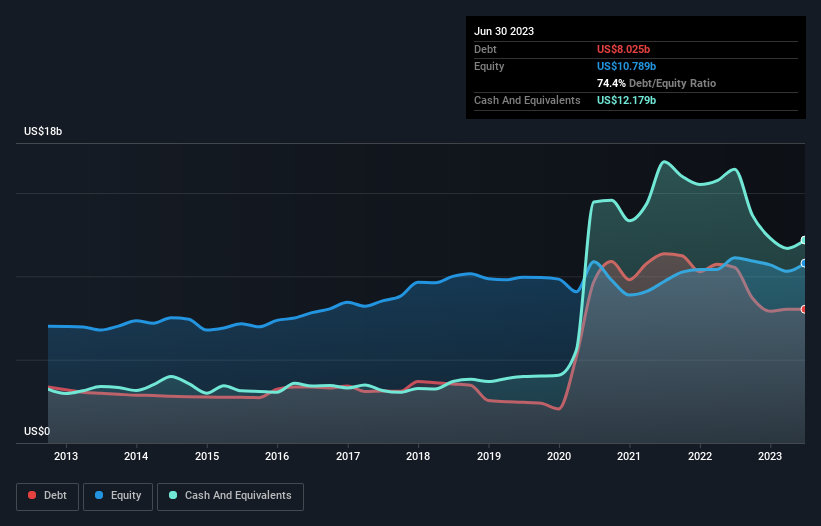- United States
- /
- Airlines
- /
- NYSE:LUV
These 4 Measures Indicate That Southwest Airlines (NYSE:LUV) Is Using Debt Extensively

David Iben put it well when he said, 'Volatility is not a risk we care about. What we care about is avoiding the permanent loss of capital.' When we think about how risky a company is, we always like to look at its use of debt, since debt overload can lead to ruin. Importantly, Southwest Airlines Co. (NYSE:LUV) does carry debt. But should shareholders be worried about its use of debt?
What Risk Does Debt Bring?
Debt is a tool to help businesses grow, but if a business is incapable of paying off its lenders, then it exists at their mercy. Ultimately, if the company can't fulfill its legal obligations to repay debt, shareholders could walk away with nothing. However, a more usual (but still expensive) situation is where a company must dilute shareholders at a cheap share price simply to get debt under control. Of course, the upside of debt is that it often represents cheap capital, especially when it replaces dilution in a company with the ability to reinvest at high rates of return. When we think about a company's use of debt, we first look at cash and debt together.
Check out our latest analysis for Southwest Airlines
What Is Southwest Airlines's Debt?
As you can see below, Southwest Airlines had US$8.03b of debt at June 2023, down from US$10.5b a year prior. However, its balance sheet shows it holds US$12.2b in cash, so it actually has US$4.15b net cash.

A Look At Southwest Airlines' Liabilities
According to the last reported balance sheet, Southwest Airlines had liabilities of US$11.7b due within 12 months, and liabilities of US$14.0b due beyond 12 months. Offsetting these obligations, it had cash of US$12.2b as well as receivables valued at US$1.22b due within 12 months. So its liabilities outweigh the sum of its cash and (near-term) receivables by US$12.3b.
This deficit is considerable relative to its very significant market capitalization of US$17.5b, so it does suggest shareholders should keep an eye on Southwest Airlines' use of debt. Should its lenders demand that it shore up the balance sheet, shareholders would likely face severe dilution. Despite its noteworthy liabilities, Southwest Airlines boasts net cash, so it's fair to say it does not have a heavy debt load!
In fact Southwest Airlines's saving grace is its low debt levels, because its EBIT has tanked 64% in the last twelve months. Falling earnings (if the trend continues) could eventually make even modest debt quite risky. The balance sheet is clearly the area to focus on when you are analysing debt. But it is future earnings, more than anything, that will determine Southwest Airlines's ability to maintain a healthy balance sheet going forward. So if you want to see what the professionals think, you might find this free report on analyst profit forecasts to be interesting.
Finally, while the tax-man may adore accounting profits, lenders only accept cold hard cash. While Southwest Airlines has net cash on its balance sheet, it's still worth taking a look at its ability to convert earnings before interest and tax (EBIT) to free cash flow, to help us understand how quickly it is building (or eroding) that cash balance. During the last two years, Southwest Airlines burned a lot of cash. While investors are no doubt expecting a reversal of that situation in due course, it clearly does mean its use of debt is more risky.
Summing Up
While Southwest Airlines does have more liabilities than liquid assets, it also has net cash of US$4.15b. Despite the cash, we do find Southwest Airlines's EBIT growth rate concerning, so we're not particularly comfortable with the stock. There's no doubt that we learn most about debt from the balance sheet. But ultimately, every company can contain risks that exist outside of the balance sheet. To that end, you should learn about the 3 warning signs we've spotted with Southwest Airlines (including 1 which doesn't sit too well with us) .
If you're interested in investing in businesses that can grow profits without the burden of debt, then check out this free list of growing businesses that have net cash on the balance sheet.
New: Manage All Your Stock Portfolios in One Place
We've created the ultimate portfolio companion for stock investors, and it's free.
• Connect an unlimited number of Portfolios and see your total in one currency
• Be alerted to new Warning Signs or Risks via email or mobile
• Track the Fair Value of your stocks
Have feedback on this article? Concerned about the content? Get in touch with us directly. Alternatively, email editorial-team (at) simplywallst.com.
This article by Simply Wall St is general in nature. We provide commentary based on historical data and analyst forecasts only using an unbiased methodology and our articles are not intended to be financial advice. It does not constitute a recommendation to buy or sell any stock, and does not take account of your objectives, or your financial situation. We aim to bring you long-term focused analysis driven by fundamental data. Note that our analysis may not factor in the latest price-sensitive company announcements or qualitative material. Simply Wall St has no position in any stocks mentioned.
About NYSE:LUV
Southwest Airlines
Operates as a passenger airline company that provides scheduled air transportation services in the United States and near-international markets.
Solid track record with adequate balance sheet.
Market Insights
Community Narratives



